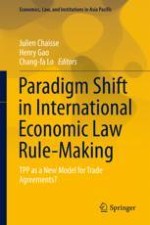2017 | OriginalPaper | Buchkapitel
15. Enhancing Labour Protection Through TPP Labour and Investment Chapters
verfasst von : Tsai-Yu Lin
Erschienen in: Paradigm Shift in International Economic Law Rule-Making
Verlag: Springer Singapore
Aktivieren Sie unsere intelligente Suche, um passende Fachinhalte oder Patente zu finden.
Wählen Sie Textabschnitte aus um mit Künstlicher Intelligenz passenden Patente zu finden. powered by
Markieren Sie Textabschnitte, um KI-gestützt weitere passende Inhalte zu finden. powered by
